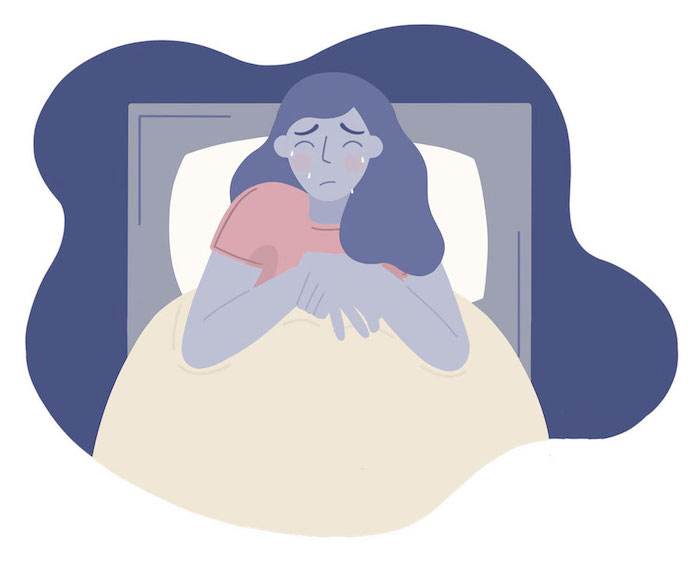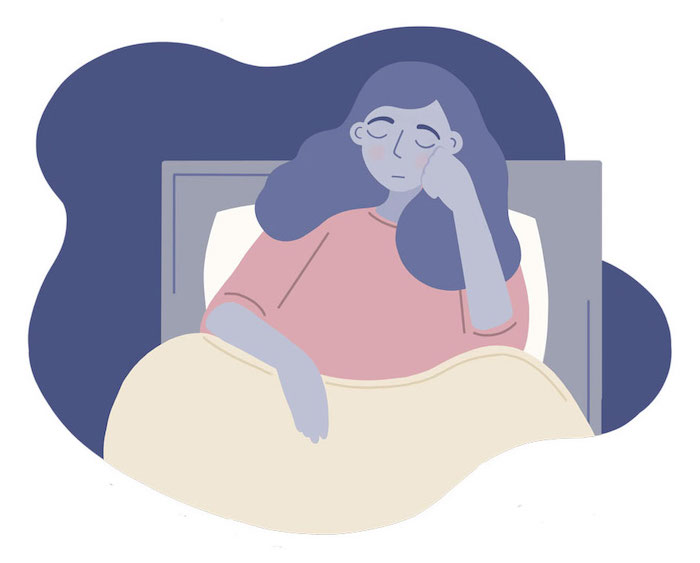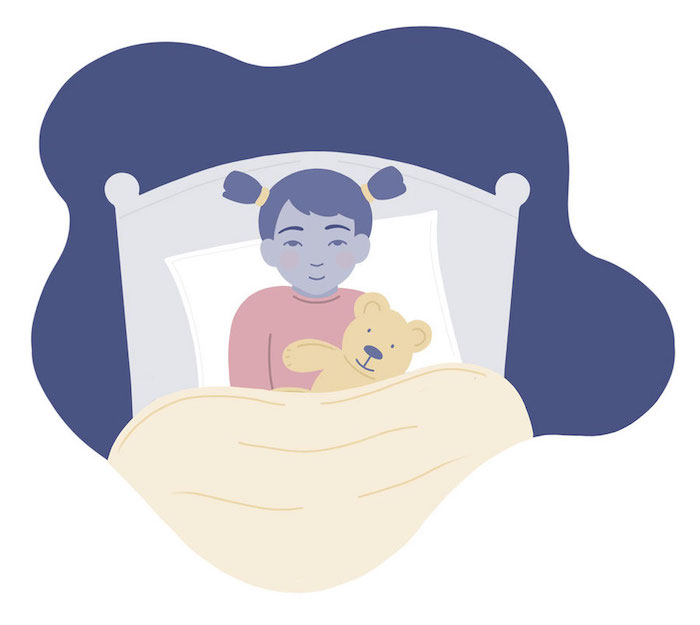Insomnia is a sleep disorder that plagues near 60 million Americans every year. Simply put, the condition occurs when someone has trouble falling asleep or staying asleep Insomnia may last for a few days, a few months, or longer! Regardless of whether a person suffers for a few nights or a few months, it can have an impact on his or her daily life and health.
First off, there are three types of insomnia: transient, acute, and chronic. Transient insomnia is the short-term form that may last up to a few weeks and is typically caused by temporary issues such as an illness or a problem at work. Acute insomnia is also temporary but longer-term, lasting for between two weeks and three months. Chronic insomnia lasts for over three months, and its effects tend to be more long-lasting.
We’ve put together everything to know about this nasty sleep disorder. We’ll discuss the symptoms, causes, and treatment options. If someone is concerned they may have insomnia, please speak with a healthcare professional.
RELATED: Most Comfortable Mattress
Symptoms Of Insomnia
First off, how do we know we have insomnia. Well, there are a number of symptoms associated with this sleep disorder. Someone may be dealing with insomnia if they exhibit the following symptoms: 
- They have trouble falling asleep or staying asleep at night.
- They may experience erratic sleep patterns such as waking up at night or too early in the morning, waking up tired, or becoming sleepy during the day.
- During the day, they may be forgetful and have trouble staying focused on tasks at school or at work.
- They may feel more anxious, irritable, or depressed.
Causes Of Insomnia
A variety of issues can lead a person to develop insomnia. Stress, worry, and excessive hours spent at work are some causes. Certain health issues and changes, such as cardiovascular problems, restless leg syndrome, acid reflux disease, and menopause are other examples.
Post-traumatic stress disorder (PTSD) can also keep a person up at night, as they may experience nightmares or be unable to sleep for fear of experiencing them. This problem is sometimes found in survivors of disasters and wars. Even for those who have not experienced serious trauma, anxiety and depression can hinder sleep.
Changing work schedules can also cause sleepers to deal with insomnia. Doctors and nurses deal with this issue on a regular basis. Without a regular sleep schedule, it is much more likely that one will have insomnia.
Also, traveling can have a negative effect on our sleep, both short term and longterm. Studies have shown that we sleep more lightly during the first nights in a new location. When we add in the upending effects of jet lag, this can be a perfect storm of insomnia symptoms.

Studies have shown that genetic factors also influence whether a person may suffer from insomnia. Parts of a human chromosome (chromosome 7) were linked to insomnia in a study involving 30,000 American soldiers. Another study involving more than 100,000 people showed that seven genes affecting various functions of the body may have an effect on whether a person develops this sleeping disorder. A Virginia Commonwealth University study suggested that women are more at risk than men due to genetics.
RELATED: What Veterans Should Know About Sleep
Consumption of certain chemicals can also result in substance-induced insomnia. Some types of medicines, illicit drugs, or beverages may contain stimulants such as caffeine, which hinders sleep. Medications such as beta-blockers and alpha-blockers that fight hypertension can result in insomnia, as can corticosteroids, some antidepressants, and statins, which fight high cholesterol. Consuming tobacco and alcohol can cause or contribute to insomnia, as can eating foods that are spicy.
People also may become addicted to sleeping pills, which makes it harder to sleep without using more of them. Detoxing from opioid drugs can result in sleep problems that take weeks to subside.
Also, let’s not forget about technology! Light-emitting gadgets like cellphones, laptops, and tablets can negatively affect our sleep. The blue light disrupts our circadian rhythms and makes it more difficult to get a full night of healthy sleep.
While insomnia can happen to anyone, certain risk factors raise the odds of its onset. Age and gender are two important factors; people over 60 years old and women have higher rates of insomnia than others.
RELATED: 4 Sleep Tips For People Who Work At Night
The Dangers Of Insomnia
So, what happens when we aren’t getting enough sleep? Insomnia is a pain in its own right, but it is also accompanied by a number of health risks.
First off, insomnia-sufferers can be more prone to accidents while at work. This gets especially frightening when we consider construction workers, doctors, and truck drivers. Working with heavy machinery or patients, one mistake can be catastrophic. A recent study even found that a large majority of new residents and nurses are not getting enough sleep.
Even for those of us who don’t drive a big rig, we probably drive to and from work. If we are struggling with insomnia or some other sleep condition, we are much more likely to get in an automobile accident. What’s more, almost 10% of all traffic accidents are caused by drowsy driving!
Insomnia has also be linked to quite a few physical and mental health conditions. For instance, those with insomnia have an increased risk of high cholesterol, diabetes, and heart disease. Insomnia can also increase our chances of developing Alzheimer’s, anxiety, and depression.
Children and Insomnia
 Children who have attention deficit hyperactivity disorder (ADHD) have a higher risk of developing sleep disorders such as insomnia. This is because they experience restlessness and anxiety even while trying to sleep. It is suspected that children with ADHD are unable to wind down at night, so their minds are still hyperactive well into their intended sleeping hours. This disruption of a good night’s sleep may contribute to the irritability and lack of focus that comes with ADHD, according to researchers.
Children who have attention deficit hyperactivity disorder (ADHD) have a higher risk of developing sleep disorders such as insomnia. This is because they experience restlessness and anxiety even while trying to sleep. It is suspected that children with ADHD are unable to wind down at night, so their minds are still hyperactive well into their intended sleeping hours. This disruption of a good night’s sleep may contribute to the irritability and lack of focus that comes with ADHD, according to researchers.
When a child has frequent bouts of insomnia, parents should definitely consider consulting with a pediatrician. In some cases, they may prescribe medications or therapy to help fight childhood insomnia. Parents should also keep children to a consistent sleep schedule, including on weekends, and daytime napping should be restricted. Parents should keep the child’s room’s temperature cool and reduce or eliminate noises at night, and if the child needs a nightlight, only use a small one.
Treatment Options
 Luckily, there are a few treatment options available for insomnia. For example, cognitive Behavioral Therapy (CBT) may be used to help patients manage or free themselves from negative behaviors or thoughts about sleep.
Luckily, there are a few treatment options available for insomnia. For example, cognitive Behavioral Therapy (CBT) may be used to help patients manage or free themselves from negative behaviors or thoughts about sleep.
Also, doctors may prescribe some medications to fight insomnia, but these are generally recommended for use only for a few weeks. According to an experiment at the Columbia University Medical Center, amber-tinted lenses in glasses may help reduce insomnia by blocking blue light, which keeps the brain more alert and less predisposed to sleep at night. Developing consistent sleep habits is another way to treat insomnia or even eliminate it.
In addition to traditional treatments for insomnia, there are alternative ways to alleviate this sleep disorder. Some of these alternatives include:
- Herbs such as valerian root are thought to have some positive effect in helping people rest better, as do chamomile, lavender, and ginseng.
- The hormone melatonin is also considered a potential solution, although it is not well understood.
- Traditional Chinese Medicine routinely uses acupuncture to fight sleep disorders like insomnia.
- Meditation is another popular technique for alleviating this problem.
Though insomnia isn’t always preventable, there are some ways to reduce the risk of developing this sleep disorder. One strategy involves getting routine exercise (such as 30 minutes of walking outside) at least three hours before going to bed. Long daytime naps can make sleeping at night more difficult and should be avoided. Abstaining from substances such as tobacco, caffeine, alcohol, and illicit drugs will also reduce the risk of insomnia.
Finally, we all need to make sure we are set up for a good night’s sleep. This may look different for each person, but it involves keeping the bedroom dark, quiet and making sure to get a great mattress and pillow.
FAQs
What is insomnia?
Insomnia is a sleep condition that makes it more difficult to fall asleep and stay asleep.
What are the symptoms of insomnia?
There are a few clear signs that someone might be struggling with insomnia. Of course, they have trouble falling asleep. In addition, they may feel tired, irritable, and unfocused the next day.
What are the causes of insomnia?
There are many reasons someone might develop insomnia. It could be genetic or it might be due to changing work schedules, stress, or other health conditions.
How can I treat my insomnia?
Insomnia is rough, but there are treatment options available. CBT (Cognitive Behavioral Therapy) and medication are two routes a medical professional might recommend. Sleepers can also practice good sleep hygiene and sleep in a cool, dark, and quiet room.
Additional Resources
- Shorter Time in Bed May Protect Against Chronic Insomnia
- How to Deal With Insomnia to Get a Good Night’s Sleep
- Eight Expert Tips to Help You Prevent Insomnia
- Sleep, Interrupted: The ADHD-Insomnia Link in Children
- ADHD and Sleep Disorders in Children
- Hope for Children With Insomnia
- The Six Biggest Risk Factors for Insomnia
- A Search for Insomnia Genes Involving 1.3 Million People
- Symptoms and Signs of Insomnia
- Insomnia: Causes, Symptoms, and Treatments
- Causes of Insomnia: Figuring Out Why You Can’t Sleep
- What Causes Insomnia?
- Veterans With PTSD
- What Causes Primary Insomnia?
- Sleep and Health
- Sleep and Sleep Disorder Statistics
Featured image: Mortiotion Films/Shutterstock

